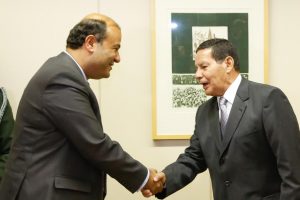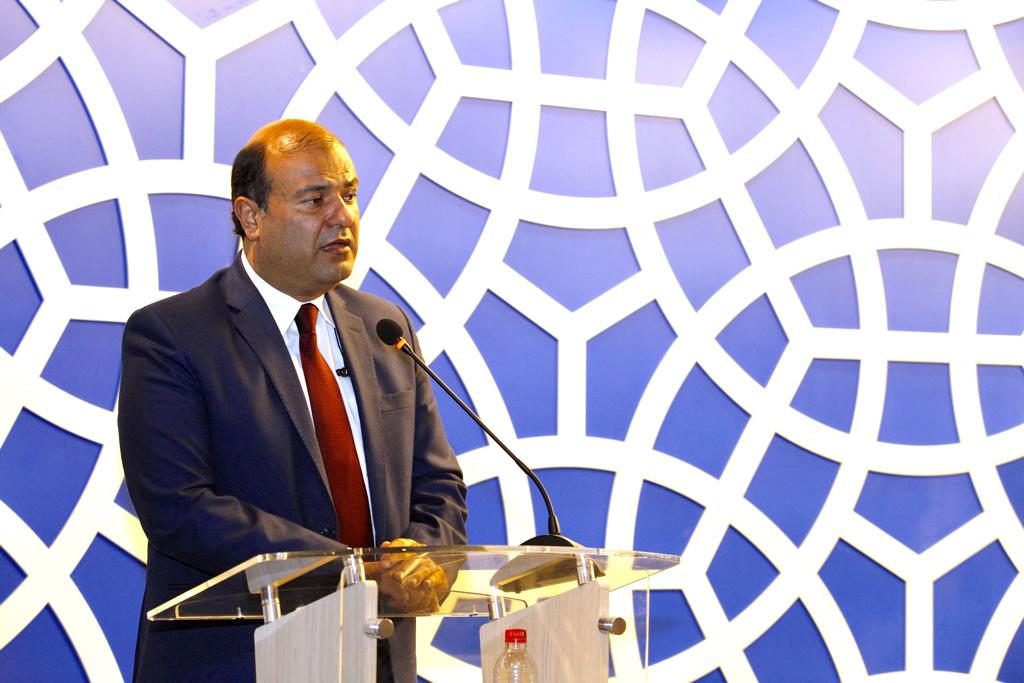São Paulo – More than any official retaliation, nods from Jair Bolsonaro’s government to Israel may displease Arab consumers and entrepreneurs, affecting trade between that region and Brazil. That is the assessment of the secretary general of the Union of Arab Chambers, the leading business entity in the Middle East and North Africa, Khaled Hanafy (photo above).
“We don’t want to interfere in Brazilian foreign policy, but we can advise Brazilians, because we know the Arab market, we know that consumers and entrepreneurs are very sensitive to this kind of announcement,” said Hanafy to ANBA. “I fear this kind of announcement may harm businesses and trade between the Arab countries and Brazil. Obviously, we are not talking about anything political,” he added.
The Union of Chambers is the League of the Arab States’ branch for the private sector. The institution’s members include chambers of commerce from all Arab nations and outside the region, such as the Arab Brazilian Chamber of Commerce.
Moving Brazilian embassy in Israel from Tel Aviv to Jerusalem was a Bolsonaro campaign promise but while visiting the country two weeks ago, the president announced only the opening of a trade office in the city. Both Israelis and Palestinians claim sovereignty over Jerusalem, and the nod to Israel has caused so much discomfort among Arabs that Bolsonaro and the ministers of Foreign Relations, Ernesto Araújo, and Agriculture, Tereza Cristina, participated in a dinner with Arab and Islamic ambassadors last week trying to clear the air.

“That dinner was a chance for us to start a dialogue, which we had been waiting since the president was elected. We had already asked for a meeting, which only happened months after the election,” said to ANBA the Palestinian ambassador in Brasília, Ibrahim Alzeben, who is also the Council of Arab Ambassadors dean in Brazil.
According to him, the dinner was served to “break the ice after statements that made Arab and Islamic countries uncomfortable.” “It was a good start and we may develop a dialogue from there,” he stressed. The diplomat now expects a formal meeting between Bolsonaro and Araújo and the Arab and Islamic ambassadors, a request made over dinner. “We are waiting for the confirmation. We asked for it to occur before Ramadan,” he declared. Ramadan, the Muslim month when the believers fast from dawn to dusk, should start on May 5 or 6.
“We will talk about a topic of interest that concerns us, Arabs and Muslims, and Palestine, since it is directly involved,” said Alzeben. “They say that the topic of [moving] the embassy is ‘on hold.’ It is something we want to be discussed and made clear,” he said.
The ambassador reiterated that Brazil should stay clear from the conflict between Israel and Palestine. “I spoke over dinner that Brazil should stay away from this conflict, because it is a matter that doesn’t concern Brazil. It is an international topic, of International Law. It is a long historical process, not a topic for one government or another,” he stressed. “It is a matter that is the hands of the [UN] Security Council, the Hague Court, the International Criminal Court, it is not something that one county can solve. Our healthy, friendly advice is to stay away, it is not necessary to meddle in the topic from one side. The whole world is on one side [of the matter] and the United States is on the other,” he pointed out.
The USA under the government of Donald Trump has moved its embassy from Tel Aviv to Jerusalem, automatically acknowledging Israel’s sovereignty over the city. The action was followed only by Guatemala.
“I want to make clear that Brazil should stay away from the conflict, not from us. It may be close to Israel, the United States, and the Arabs. May it take advantage of the Arab consumer, the Israeli technology, but away from the conflict,” stressed Alzeben.
Feeling

Hanafy was in Brazil in January when he met with vice-president Hamilton Mourão and other representatives of the Brazilian government. Alzeben also met with the VP earlier this year. Mourão said in the meeting that Brazil was not considering moving the embassy back then.
Last week, Araújo said the announcement of the opening of an office in Jerusalem to foster businesses with Israel has not affected trade with the Arab world but since Bolsonaro was elected, foreign trade professionals, representatives of sectors interested in businesses with the Arab world, and the Arab Brazilian Chamber itself have insisted that the eventual effects will not be felt in the short-term but in the mid- and long-term.
“When the minister insists in announcing the trade with the Arab world has not been affected, let me tell you a fact: when I was [in Brazil] and met with the vice-president, the announcement made by him and other authorities was positive, and it led to a growth in trade, it led Arab consumers and entrepreneurs to have a positive look on the issue,” said Hanafy.
“What I mean by that is that the Arab market players are very sensitive to authority announcements, particularly those related to Israel. Anyone that wants to speak over this matter should pay attention to entrepreneurs’ and consumers’ response,” he added. “My advice for the authorities is: please, be careful with the announcements you make about this matter. The problem is saying that the Arab countries will not be affected or that Arab consumers will not be affected. We know the Arab consumer, we know the Arab entrepreneurs, and they are very sensitive,” he stressed.
Hanafy told that he has recently been to Moscow with a delegation of Arab entrepreneurs and some of them started negotiating importing grains from Russia. “From the experience we have with other suppliers from other countries is that when consumers change their preference over some product origin, it is very difficult to come back. And this may affect not only business with Brazil but jobs and small enterprises as well,” he said. “Again, my advice is: be worried,” he concluded.
Translated by Guilherme Miranda




